Masterclass

Origins, principles, and relevance of deliberative democracy
01/MasterClass

André Noel Roth
He holds a degree in Political Science (1990), a Master’s degree in Political Science (1994), and a PhD in Economic and Social Sciences with a specialization in Political Science (1999) from the University of Geneva, Switzerland. He has taught public policy analysis in Switzerland and at several universities in Colombia and Latin America. Since 2006, he has been a Research Professor (currently tenured) in the Department of Political Science at the Faculty of Law, Political and Social Sciences (FDCPyS) of the National University of Colombia, Bogotá. He has held the positions of Coordinator of the Doctorate in Political Studies and International Relations, Director of the journal Ciencia Política, Director of the UNIJUS Socio-Legal Research Institute, and Vice Dean of Research and Extension at the FDCPyS. He is also Director of the Research Group “Analysis of Public Policies and Public Management” (APPGP) (category B Colciencias 2021), Coordinator of the Laboratory for Innovation in Governance (GobLab) at the FDCPyS, Co-coordinator of the Comparative Public Policies group at ALACIP, and Co-editor of the journal Mundos Plurales (FLACSO-Ecuador). He has published several books and dozens of chapters and articles on public policy and administration.

Origins, principles, and relevance of deliberative democracy
To understand the theoretical and historical foundations of deliberative democracy and reflect on its current relevance in different territories.
Conceptualization, basic principles, and democratic value of deliberative processes.
- 0:00 - Introduction: What is deliberative democracy?
- 4:12 - Where does deliberative democracy come from?
- 6:25 - Rhetoric
- 8:44 - Who are the key figures in the history of deliberative democracy?
- 17:51 - What is deliberation?
- 21:40 - Why is deliberative democracy important?
- 25:41 - Why does the representative model prevail?
- 27:49 - How do representative democracy and deliberative democracy mix?
- 40:49 - The crisis of representative democracy